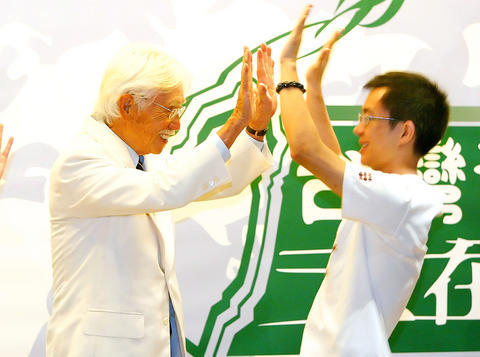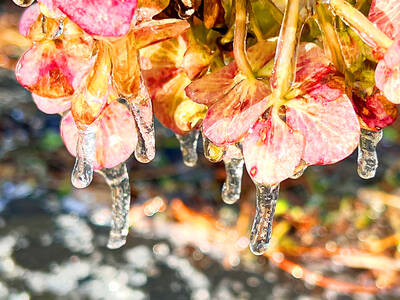Veteran independence advocate Koo Kwan-min (
The forum was held by several pro-independence youth organizations in Taipei.
Koo started by sharing his life stories and beliefs.

PHOTO: CNA
"When I was a kid, I attended schools where most of the students were Japanese," Koo said.
Koo was born in 1926 during the Japanese colonial period.
As a Taiwanese, Koo often suffered discrimination by his Japanese classmates, but he never surrendered, Koo said.
"They [the Japanese students] said I should be humble because I was Taiwanese and they wanted me to apologize for not being humble enough. But I refused to do that," Koo said.
"So they beat me, and I fought back and never surrendered to them" Koo told the audience.
Koo told his audience that his childhood experiences had taught him to fight injustice and to hold on to his beliefs.
"Maybe you're young, inexperienced and maybe you're just an ordinary person ... but as long as you hold on to what you believe, you'll win the respect [of others] one day," Koo said.
He said that his struggle against the colonial regimes that ruled Taiwan -- be it the Japanese or the Chinese Nationalist Party (KMT) -- and to help to establish Taiwan as a self-sustained nation were his life-long beliefs.
Asked by a member of the audience if he was worried about a Chinese military intervention if Taiwan were to declare independence, Koo said "I wouldn't worry about it."
"China's economy relies on foreign investment along the coastline. If a war breaks out between Taiwan and China, China's economy would simply collapse as foreign investment would melt away," he said. "That would be a real disaster for China."
Koo, however, said that if China developed into a self-sustained economy, "the situation could change."
As most of the cash flow doesn't return to Taiwan, "the tighter the relations between the two countries, the worse the economic condition would be for Taiwan," he said.
"A lot of people are against Taiwan's independence while they benefit from Taiwan's status as an independent country," he said.

The Taipei City Government yesterday said contractors organizing its New Year’s Eve celebrations would be held responsible after a jumbo screen played a Beijing-ran television channel near the event’s end. An image showing China Central Television (CCTV) Channel 3 being displayed was posted on the social media platform Threads, sparking an outcry on the Internet over Beijing’s alleged political infiltration of the municipal government. A Taipei Department of Information and Tourism spokesman said event workers had made a “grave mistake” and that the Television Broadcasts Satellite (TVBS) group had the contract to operate the screens. The city would apply contractual penalties on TVBS

A new board game set against the backdrop of armed conflict around Taiwan is to be released next month, amid renewed threats from Beijing, inviting players to participate in an imaginary Chinese invasion 20 years from now. China has ramped up military activity close to Taiwan in the past few years, including massing naval forces around the nation. The game, titled 2045, tasks players with navigating the troubles of war using colorful action cards and role-playing as characters involved in operations 10 days before a fictional Chinese invasion of Taiwan. That includes members of the armed forces, Chinese sleeper agents and pro-China politicians

The lowest temperature in a low-lying area recorded early yesterday morning was in Miaoli County’s Gongguan Township (公館), at 6.8°C, due to a strong cold air mass and the effect of radiative cooling, the Central Weather Administration (CWA) said. In other areas, Chiayi’s East District (東區) recorded a low of 8.2°C and Yunlin County’s Huwei Township (虎尾) recorded 8.5°C, CWA data showed. The cold air mass was at its strongest from Saturday night to the early hours of yesterday. It brought temperatures down to 9°C to 11°C in areas across the nation and the outlying Kinmen and Lienchiang (Matsu) counties,

STAY VIGILANT: When experiencing symptoms of carbon monoxide poisoning, such as dizziness or fatigue, near a water heater, open windows and doors to ventilate the area Rooftop flue water heaters should only be installed outdoors or in properly ventilated areas to prevent toxic gas from building up, the Yilan County Fire Department said, after a man in Taipei died of carbon monoxide poisoning on Monday last week. The 39-year-old man, surnamed Chen (陳), an assistant professor at Providence University in Taichung, was at his Taipei home for the holidays when the incident occurred, news reports said. He was taking a shower in the bathroom of a rooftop addition when carbon monoxide — a poisonous byproduct of combustion — leaked from a water heater installed in a poorly ventilated